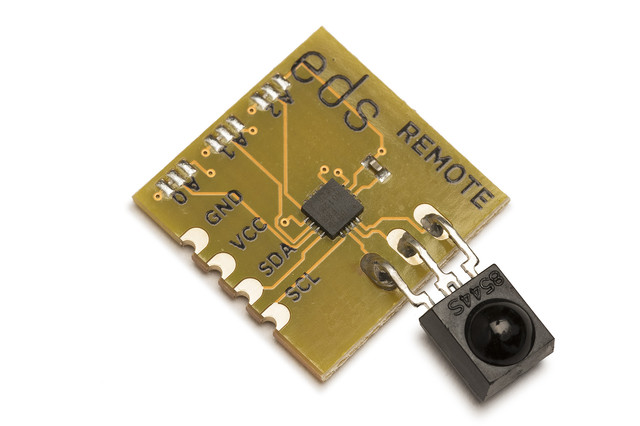Electric Dollar Store
REMOTE combines a sensitive IR receiver with a I²C decoder, to add a remote control function to any project. It continuously scans for IR commands, and reports each one as a 4-byte (32 bit) identifier, with a millisecond timestamp. It also has a simplified function which works with the IR transmitter, reporting any keypresses as ASCII codes. For both receive functions, there is a FIFO of 16 entries. Up to 8 REMOTEs can share an I²C bus under completely independent control.
import sys
import time
from i2cdriver import I2CDriver, EDS
if __name__ == '__main__':
i2 = I2CDriver(sys.argv[1], True)
d = EDS.Remote(i2)
print("Press a remote button")
while 1:
k = d.key()
if k is not None:
print("Key : %r" % k)
r = d.raw()
if r is not None:
(code, timestamp) = r
print("Raw code: %02x %02x %02x %02x (time %.2f)" % (code[0], code[1], code[2], code[3], timestamp))
#include <Wire.h>
char remote_read()
{
Wire.beginTransmission(0x60);
Wire.write(0);
Wire.endTransmission(false);
Wire.requestFrom(0x60, 1);
return Wire.read();
}
void setup() {
Serial.begin(115200);
Wire.begin();
}
void loop() {
char k = remote_read();
if (k)
Serial.println(k);
}
from machine import I2C
import struct
import time
class Remote:
""" REMOTE is a NEC IR code receiver / decoder """
def __init__(self, i2, a = 0x60):
self.i2 = i2
self.a = a
def regrd(self, addr, fmt = "B"):
b = self.i2.readfrom_mem(self.a, addr, struct.calcsize(fmt))
return struct.unpack(fmt, b)
def key(self):
"""
For the electricdollarstore IR transmitter.
If there is a code in the queue, return its character code.
The layout of the remote is
p c n
< > ' '
- + =
0 % &
1 2 3
4 5 6
7 8 9
If there is no IR code in the queue, return None.
"""
(r,) = self.regrd(0)
if r != 0:
return chr(r)
def raw(self):
"""
If there is a code in the queue, return a tuple containing the four-byte code,
and a timestamp.
If there is no IR code in the queue, return None.
"""
r = self.regrd(1, "4BH")
if r[:4] != (0xff, 0xff, 0xff, 0xff):
age_in_ms = r[4]
return (r[:4], time.time() - age_in_ms * .001)
else:
return None
def main():
i2 = I2C(1, freq = 100000)
d = Remote(i2)
print("Press a remote button")
while 1:
k = d.key()
if k is not None:
print("Key : %r" % k)
r = d.raw()
if r is not None:
(code, timestamp) = r
print("Raw code: %02x %02x %02x %02x (time %.2f)" % (code[0], code[1], code[2], code[3], timestamp))
| Default I²C address | 0x60 (0b1100000) |
| Current consumption (typ.) | 5 mA |
| Vcc | 2.2 - 3.6 V |

